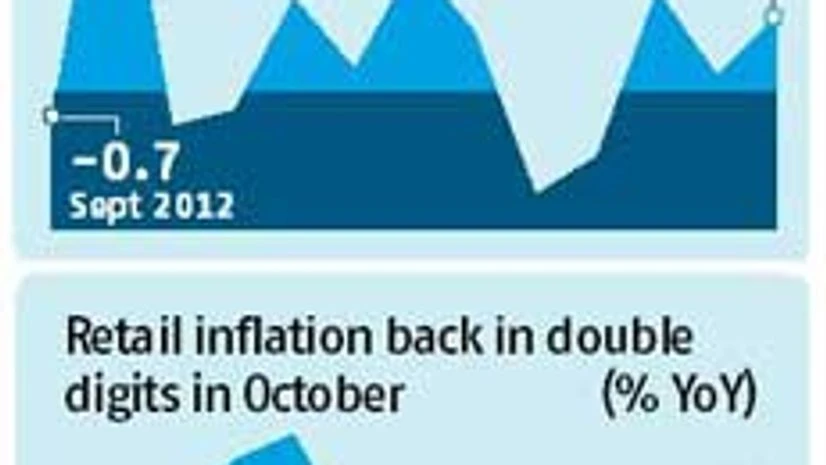The expectation that the pre-festival month of September would be one of a demand revival looked punctured on Tuesday, as government data revealed India’s industrial production in the month had risen a mere two per cent from that a year back, compared with 0.4 per cent in August. The tepid show was mainly on account of a continued decline in output of capital goods, as high interest rates kept demand for consumer durables low.
The bright spots, however, were mining (production up 3.3 per cent after a contraction for 10 months in a row) and electricity generation (up 13 per cent), showed data released by the Ministry of Statistics and Programme Implementation (Mospi).
The industrial production data — released a day after trade numbers revealed exports in October had risen at a double-digit rate, for a fourth straight month, meaning there had been a demand revival in other countries — indicated the domestic market continued to suffer a demand slowdown. (TEPID SHOW)
Meanwhile, another set of data released on Tuesday showed the rate of retail inflation, based on the Consumer Price Index, had returned to double digits in October, after six months, at 10.1 per cent, against 9.84 per cent the previous month.
For the industrial output growth, what looked more disappointing was the fact that it had remained weak despite a low base — the Index of Industrial Production (IIP) had contracted 0.7 per cent in September 2012.
The production growth in the first half of this year, as a result, remained almost stagnant at 0.4 per cent, against 0.1 per cent in the same period last year.
“This is disappointing; the expected turnaround has not been realised,” said CARE Ratings Chief Economist Madan Sabnavis. Also, given the weak show in September, the wait for a sustained industrial recovery might get longer, as the next month will see a high base — more than eight per cent growth in October last year.
The government, however, exuded confidence of a pick-up in the second half of this financial year.

“The growth in the first half has remained (near) flat, but we are moving in the right direction; this is an improvement from the August numbers. A pick-up will be seen in the second half,” C Rangarajan, chairman of the Prime Minister’s Economic Advisory Council (PMEAC), told Business Standard.
He said he expected the industries to grow three per cent in the second half. That would take the annual industrial output expansion to 1.5 per cent for 2013-14.
Manufacturing, which accounts for more than 75 person of IIP, grew at a sluggish 0.6 per cent this month, against a 1.6 per cent decline in September last year. “It is the manufacturing sector that has let industries down,” said Sabnavis.
The output of consumer durable goods has been declining all this year; these contracted a steep 10.8 per cent in September. Consumer non-durables, on the other hand, grew 11.3 per cent, against 1.4 per cent. As a net effect, the consumer goods rose by a low 0.6 per cent in the month, compared with a stagnation in the same period last year.
“This, naturally, shows that people are restraining themselves from spending on non-food items due to high inflation,” Sabnavis added.
Garments output jumped 29.2 per cent in September and contributed 0.81 per cent to the overall industrial index, mainly due to a rise in demand.
“This is due to high demand in both international market — also seen in export numbers — and the domestic market,” said Ajay Kumar, economist at Confederation of Indian Textile Industry (CITI).
The capital goods continued to perform at a sluggish pace, contracting 6.8 per cent in this month, against a 13.3 per cent decline in output a year ago.
“This reflects low investment demand, which will pick up once more projects are cleared by the government. That will be reflected in the second half,” said Rangarajan.
Also, the industrial output numbers were subdued despite the eight core sector industries growing eight per cent in September.
On this, experts said the core sector, which constitutes 38 per cent of IIP, includes mainly intermediate and basic goods. The intermediate goods and basic goods grew by 4.1 per cent and 5.4 per cent, respectively, in September.
Lacklustre industrial growth might also take a toll on the larger economic growth rate — at a ten-year low of five per cent in 2012-13 and a four-year bottom of 4.4 per cent in the first quarter of 2013-14.
Independent analysts have pegged economic growth at below five per cent for the current financial year, while the government was sure it would cross five per cent.

)
